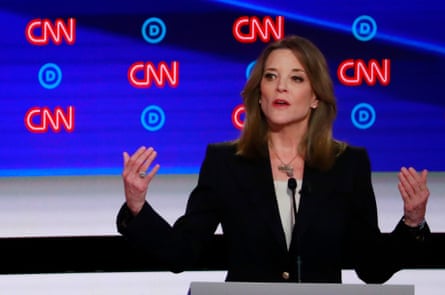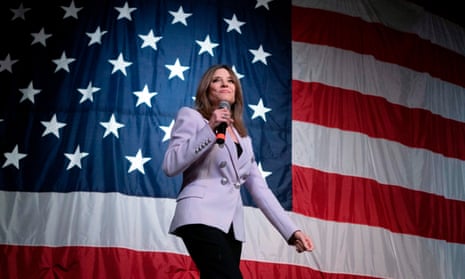A penthouse-gym in north-west Washington DC served as a campaign stage for the long-shot Democratic presidential candidate Marianne Williamson last week. Athleisure-clad political consultants came and went, as if typecast from a political TV drama. The Washington monument poked between buildings in the distance.
Williamson is far from an average political candidate, even in the modern era of American politics where it often feels much of what was once unthinkable has become a scary new normal. She is not a politician, but instead an author and wellness guru, whose quixotic first tilt at the White House four years ago was far from successful but saw her grace the Democratic debates and score a viral hit with her message to Donald Trump that she would “harness love” to defeat him.
This time around, Williamson is running a tougher, more grounded campaign – treading the turf as a political outsider appalled at how America’s political elites have ignored the needs of its ordinary people.
The chances that Williamson will become Democratic nominee for president next year are very slim. But there’s no doubt that her message has the power to resonate, particularly among the young and with women, and with those who feel America’s current travails cut deep and are being ignored.
“I’ve had a 40-year-career working with people whose lives are in trouble. When I started that was the exception, not the rule. The work I did then was an adequate response to the suffering I saw in front of me, but now there seems to be a ubiquitous wave of people’s lives falling apart.”
Williamson is also increasingly clear on some of the traditional barriers she faces. Williamson, 70, is just the second woman – the first being Republican Nikki Haley – to have thrown her name into the 2024 presidential nomination contest ring. Both have received a seemingly reflexive push-back from their respective parties and some quarters of the media.
Sexist? Quite possibly.
“An obelisk is much more than a phallus,” Williamson said at her event, observing the monument beyond. And then more directly: “You don’t even know what misogyny is until you’ve been a woman running for president.”
But Williamson was less interested in symbols of power than her political agenda. She’s never held public office, though she ran unsuccessfully for California’s 33rd congressional district in 2014, and for the Democratic party nomination in 2019, endorsing Bernie Sanders after dropping out the following year.
Among her platform positions is an increase in the minimum wage, reparations for racial injustice, a more muscular response to climate change, comprehensive educational reforms and the creation of a US Department of Peace. She talks of “soulless hyper-capitalism” which she sees as the fundamental affliction of an America run by a government “of the corporations, by the corporations and for the corporations”.
Now she’s doggedly upgrading her old messaging about personal growth and universal love, attempting to dig a channel from new age enlightenment to political power, and to turn around what she sees as an economic, environmental and social crisis engulfing America.

“I’m socio-economically well-travelled,” she said. “And my experience has had to do with the endurance and transformation of chaos. I’m interested in the principles of truth, and the realization that America is out of control. America is in chaos.”
The liberal, Jewish ex-lounge singer from Texas arrived in Los Angeles in the 1980s and began to gather the stars – Madonna, Michael, Liz and Warren – and Hollywood power brokers of the era around self-healing psychotherapy and applied her energy to the Aids crisis.
She set up in New York, giving a talk once a month on a Course of Miracles. Her career took off via Oprah Winfrey, and she became known as the TV star’s “spiritual adviser”. A book publishing empire followed. Almost all her titles applied “love” to whatever the title subject at hand.
After her first run for the party nomination in 2020 she moved to Washington, which she describes as a walled city, not a bubble. She’d recently gotten out to visit East Palestine, Ohio, after the toxic train derailment turned the sleepy burgh into a byword for chemical disaster at the hands of a big corporation.
“The economically oppressed in this country are being oppressed by the same forces, whether on the left or the right. The real divide is not left and right, that’s a veil of illusion, it’s between those who are suffering and those who don’t seem to have a clue. It’s about millions of people living with chronic economic insecurity,” she said.
There’s little sign that those actually arranging Democrat political power have much time for Williamson, and they have fenced her out. But she is not put off, touring the country and doing campaign stops.
“Why would I capitulate? I’m a 70-year-old woman. I’m not part of that system. I’m not coming from that place of do what they tell you and you might get on that committee or get to run in 2028,” she said.
“There’s such a fear of Donald Trump, they assume the best way to go is with Joe Biden. I disagree. You have to be in complete denial to think that status quo, transactional politics are going to be enough to defeat the energy that he [Trump] represents.
“People are blinded by their fear of him,” Williamson continued. “They think if they attack him enough people will change their minds. But this a man who said he could shoot someone on Fifth Avenue and supporters wouldn’t care, and I think that’s probably true.
“You’ll beat him by offering the American people a better deal, and agenda for genuine economic reform, an economic U-turn.”
Integral to that, she said, would be a 21st-century economic bill of rights – universal healthcare, free tuition, free childcare, paid family leave, guaranteed housing, a livable wage and sick pay.
Last week, Williamson also announced plans for a Department of Children and Youth, arguing that children, because they have no economic agency and no vote, are “systematically neglected”.
“Public policy in America sets children up to fail. Our children are the biggest collateral damage from hyper-capitalism. So I would place a tremendous focus on children, and create a massive transformation of resources. I want every school to be a center of learning, culture and arts.”

Students go to school in fear of gun violence, a situation she says that will exacerbate mental health issues in the future. The current debate, she says, doesn’t begin to address the issue. “It’s a sophomoric question, is it cultural or is it guns? It’s both. It’s gun safety laws and the glamorization of violence that people make money off.
“Our food policies are violent, our climate policies are violent, our justice policies are violent, our economic policies are violent. The violence perpetrated against women on TV blows my mind – and the emotional violence on social media. We’ve sexualized violence, and we will have a violent society until we chose to become non-violent.”
But her message of love and equity could be marred by other reports of the author behind the scenes. Shortly after she announced her run, Politico ran an article claiming she had episodes of “foaming, spitting, uncontrollable rage” during her 2020 White House run. Williamson later called the accusations a “hit piece”.
“I raised my voice in the office. They said I threw a phone but I’ve never thrown a phone at anyone. If people feel I’ve been disrespectful to them, of course, I’m very sorry,” she says.
Some also detect a political hand. Williamson has claimed the Democratic National Committee is “rigging” the party’s primaries in favor of Biden by ruling out a debate – “candidate suppression if a form of voter suppression,” she says – and the White House press secretary, Karine Jean-Pierre, responded to questions about Williamson’s candidacy with jokes about auras and crystal balls.
“Of course they call me an unserious candidate because they don’t want to be called to the carpet for being so unserious about the things that matter most,” she hit back.
“Of course they would see me and those like me as dangerous, because from the perch they’re on I am dangerous.”
Politicians love to talk, but none possibly as much as Oprah-trained spiritual gurus turned politicians. And Williamson is now on a tear. Over the past month, 38 videos have gleaned 4m views and more than 600,000 “likes” on Gen-Z popular TikTok.
But this may be where Williamson likes to be – firing salvoes, getting her voice out there, offering the damned salvation, slipping on occasion into what sounds like life-coaching.
And after the traumatic four-year experiment of allowing a political outsider from the far right to enter the walled city of US politics without knowledge of or care to learn how the levers of political power operate, resistance to another outsider on a political quest is unquestionably elevated.
“I can see that it would be an extremely difficult job, and I can’t imagine that it would be fun every day,” Williamson says of the prospect of the presidency.
“I would simply try to be as good a person as I can be. I’m not claiming to be what I’m not. I’m running for president, not sainthood. I am a decent woman who has, I feel, some insights about this country and some insights about what is happening that could be of value.”
